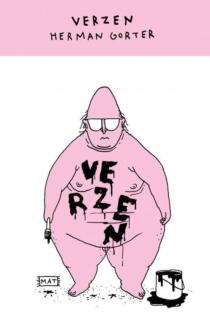In recent literary histories, Kloos has been portrayed as an emotionally unstable poet who wrote a handful of brilliant verses in his youth and after that lapsed into repetition and doggerel. However, to present Kloos’ oeuvre in this way is to detract from the role that his work played in literary history and the influence that it exerted on many generations of poets in the Netherlands and Flanders.
In 1894, Kloos published his collection Verses, which he compiled from the poems he had written up to that point as well as three longer pieces in verse form: Rhodopis, Okeanos and Sappho. A student of classical languages, Kloos used Greek myths to elucidate his views on the relationship between the emotions and the mind. These pieces are situated in the middle of the collection. Before them, there are 93 lyric verses followed by the so-called “insult sonnets”.
He wrote the lyric verses between approximately 1880 and 1888. He published them in separate volumes of De Nieuwe Gids, the magazine he co-founded in 1885. Kloos did not produce any poems in the late eighties and early nineties of the nineteenth century as a result of in-fighting between the editors. This changed in 1892 when he wrote a stream of over eighty insult sonnets, in which he remorselessly mocked his former friends and anyone else who had crossed him. Oddly enough, the poems in the collection are not arranged chronologically. Instead, the order is random and the poems are simply given a Roman numeral.
Kloos used the sonnet form for most of his verses. He took great pains with the rhyme schemes, metre and rhythms of his poetry because he believed that the form of the poem was decisive for conveying his message.
Kloos’ debut collection is a classic of Dutch-language literature for several reasons. Above all, it is a work that both reflects and influences the time in which it was created
The lyric sonnets illustrate the break from the past that Kloos wanted to effect. He wanted to get rid of “hearthside poetry” and the attitude to poetry that prevailed in the Netherlands of the time, and he had the courage to fight for change. He used his poetry to do so as well as his critical work. The insult sonnets testify to an oppressive period - full of arguments and an editorial board that completely collapses.
The collection contains a number of poems that have easily withstood the test of time. Among these, the poems he wrote about the death of Jacques Perk, and the cycle The Book of Child and God, in which he addresses Albert Verwey, are prime examples.
The modern reader who picks up Kloos’ debut collection feels drawn to a poet who did not wish to fit in with conventions, sought his own path and felt compelled to write verses that went against the current.






